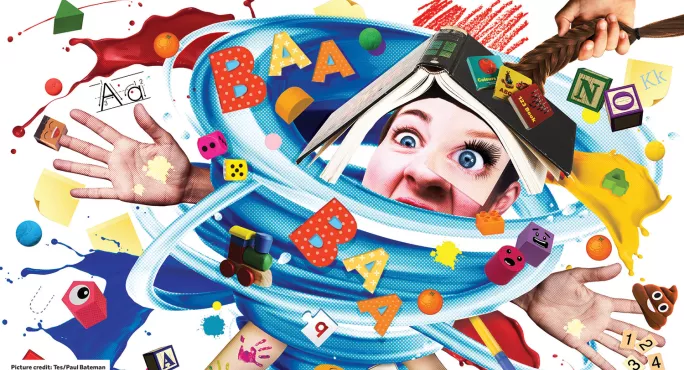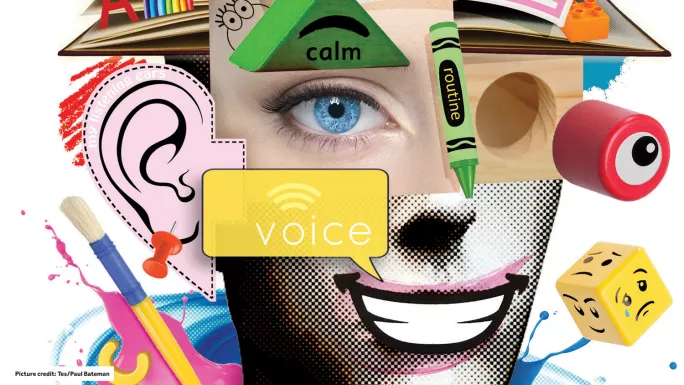- Home
- The beginner’s guide to early years survival
The beginner’s guide to early years survival

As a student teacher, I approached my new Reception class placement with confidence. I’d just aced a placement in Year 1 and was pretty sure that Reception would be much of the same, just with slightly smaller children.
Four hours into my first day, I stood in the middle of what felt like carnage in its most pure form, holding a poo that a child had handed to me (“Surprise! This fell out of my bum”) and reassessed my position: my surroundings were in lurid Technicolor, I was surrounded by shrieking munchkins…I was pretty sure I wasn’t in Kansas any more.
Now, where were those ruby slippers when I needed them?
It’s easy to dismiss teaching in early years foundation stage (EYFS) as the soft option. When you’ve spent a morning teaching long division to an unenthusiastic bunch of Year 4s, or marking endless Year 2 writing assessments, and the Reception teacher wafts into the staffroom wearing a plastic tiara and humming Five Little Speckled Frogs, it seems pretty clear who’s got the best option.
But really, EYFS is nothing like what you think it is. I gathered some EYFS troops to help me to set the record straight.
Misconception 1
There’s no marking
“Oh God, the assessment!” wails Emma Lowe, an EYFS teacher from North Yorkshire. “Seven areas of learning with endless outcomes for each area, each of which requires recorded evidence. I spend so much more time on it than I ever did when I taught in key stage 1.”
She’s right: your average member of EYFS staff is a stealth ninja with the camera, an expert at scribbling down assessment notes on Post-its, and an IT wizard with spreadsheets.
Misconception 2
Behaviour management is easy
A four-year-old in full meltdown is something to behold. And were you aware that many under-5s are not averse to a bit of recreational biting and hair pulling? Still not fazed? OK, I hereby assign you the task of walking a new Reception class quietly into assembly, getting them all facing the right way and ensuring that nobody commando-rolls under the head’s feet or sings Baa Baa Black Sheep throughout.
Misconception 3
All you do is play with kids all day
“Well, yes. But that’s the point, isn’t it?” says Lowe. “EYFS teachers are masters of play. They set up creative ways for children to learn, know when to join in to maximise learning potential and when to hang back and observe, and they keep the environment calm at the same time. It’s not as easy as it looks.”
Misconception 4
There’s no pressure
“I face constant top-down pressure from the rest of the school,” says Reception teacher Matt Crosby. “We know that if children don’t reach a certain standard by the end of EYFS, it gets harder for them to catch up.”
Children often enter a Reception class with minimal language, few personal-care skills and no support at home. Getting a class like this to face you on the carpet and write their names feels like an enormous achievement, but it doesn’t cut it when the Year 1 teacher needs them to be able to identify all letters of the alphabet, read simple sentences, count objects accurately, and all manner of other things by the end of EYFS.

Still tempted to give it a try? Here are some top tips to make your transition to the early years easier:
1. Prepare yourself for a tough first half-term
A big difference between EYFS and KS1 and 2 is that you’ll be dealing with children who have no prior experience of school, so you’re starting from scratch with routines, behaviour and some very basic concepts. The first few weeks are like herding a group of delinquent cats that haven’t been toilet trained yet, and you will be on your knees with exhaustion.
Then you come back after October half-term, look around and they’re all in roughly the right place doing more or less what they’re supposed to be doing. It’s a great feeling.
2. Have a back-up wardrobe
“Always have a spare change of clothes,” says Lowe. “At some point you’re going to get vomited on, covered in paint or rolled in shaving foam.”
3. Find your foundation-stage voice
Use expression and enthusiasm, and if in doubt, keep your voice down; young children are often intimidated by loud voices, and speaking quietly tempts them to listen carefully. A booming voice often goes straight over their heads.
4. Be clear about expectations for behaviour from the start
Set up an age-appropriate system for sanctions (such as time out), and most importantly, deal with any misbehaviour immediately. “Young children won’t link a sanction with the behaviour that caused it unless it happens straight away,” explains Crosby. “If you leave punishment until hours later, they’ve often forgotten what they did to deserve it in the first place.”
5. Keep up an ongoing dialogue with the senior leadership team about resources
“There is pressure to keep your classroom fresh, exciting and well-resourced, but there never seems to be any money to do this,” says Crosby. “You will spend endless weekends trawling Wilkos and The Works for toys, craft items and stationery, and the amount of money you spend really adds up. Management need to be aware if an EYFS classroom is underresourced and teachers are spending their own money to fund this.”
6. Keep the classroom manageable
Foundation-stage classrooms can feel chaotic due to the sheer amount of toys, games and equipment that they house. Set up clear zones for each area of learning or activity and be firm about getting the children to tidy up thoroughly at the end of every session.
I found that taking a photo of each area when it was tidy and taping it to the wall helps; it gives the children a visual reference of what it should look like when it’s tidy.
7. Think about your vocabulary
“On my first day in Reception, I told a group of children that they would be working with me at the table,” says Crosby. “They looked at me with puzzled faces.”
“What’s working?” one of them asked.
Pause often to explain what a word means, even if it seems obvious to you.
8. Never assume prior knowledge of anything
This is easily remembered when working with nursery-age children, but I fell foul of this with my Reception class. On the first morning, I gave each of them a coloured sticker to wear to divide them into groups, then asked everyone with a blue sticker to stand up. It turned out that half of them had no idea what colour their stickers were (except for the class brainbox who identified himself early on by saying “Mine’s turquoise. Would you say that counts as blue or green?”)
9. Dredge up some extra patience
You might not think it’s possible for someone to fail to grasp that the number that comes after 1 is 2, or to wet themselves three times in an hour, or to consistently use a paintbrush upside-down. And yet…
10. Set a routine and stick to it
“My class self-register every morning, then choose between a pattern-drawing activity or looking at a book while I get everybody settled. It starts the day calmly and means that everybody is in one place,” says Lowe. Routines such as these make children feel safe and in control, and make classroom management easier.
11. Be the noisy neighbour
“Entice colleagues from other year groups into your classroom with the promise of Lego and Play-Doh,” says Crosby. “The more they interact with EYFS children, the better they’ll understand where the children they teach have come from and the more supportive they’ll be. It might even encourage them to adopt some EYFS principles higher up in the school. That can only be a good thing.”
Lisa Jarmin is an EYFS teacher and freelance writer
Keep reading for just £1 per month
You've reached your limit of free articles this month. Subscribe for £1 per month for three months and get:
- Unlimited access to all Tes magazine content
- Exclusive subscriber-only stories
- Award-winning email newsletters



